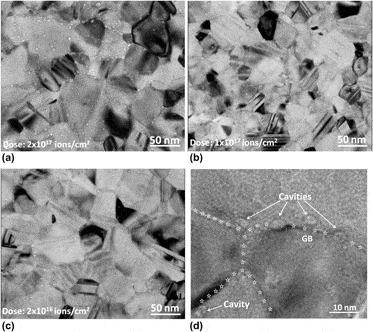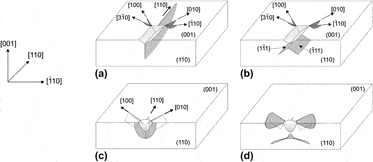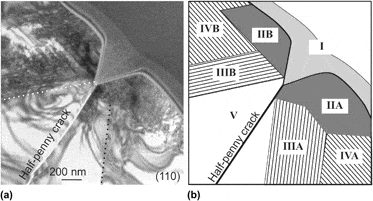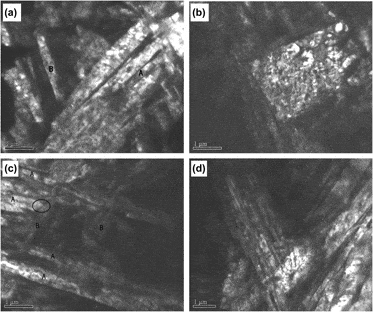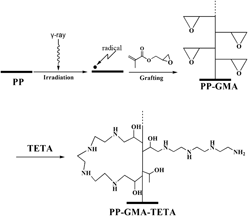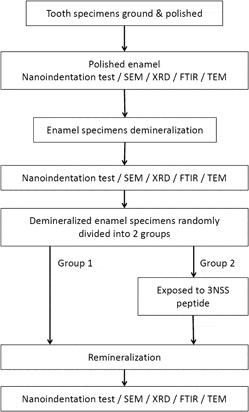FIG. 5(b). NG Cu irradiated to fluences of 1×1017 ions/cm2. [W.Z. Han, E.G. Fu, M.J. Demkowicz, Y.Q. Wang, and A. Misra: Irradiation damage of single crystal, coarse-grained and nano-grained copper under helium bombardment at 450 °C. p. 2763].
Invited Feature Papers
Irradiation damage of single crystal, coarse-grained, and nanograined copper under helium bombardment at 450 °C
-
- Published online by Cambridge University Press:
- 22 October 2013, pp. 2763-2770
-
- Article
- Export citation
Detection of surface electronic defect states in low and high-k dielectrics using reflection electron energy loss spectroscopy
-
- Published online by Cambridge University Press:
- 15 October 2013, pp. 2771-2784
-
- Article
- Export citation
Articles
Nanoindentation cracking in gallium arsenide: Part I. In situ SEM nanoindentation
-
- Published online by Cambridge University Press:
- 22 October 2013, pp. 2785-2798
-
- Article
- Export citation
Nanoindentation cracking in gallium arsenide: Part II. TEM investigation
-
- Published online by Cambridge University Press:
- 22 October 2013, pp. 2799-2809
-
- Article
- Export citation
Effect of strong magnetic field on solid solubility and microsegregation during directional solidification of Al–Cu alloy
-
- Published online by Cambridge University Press:
- 10 October 2013, pp. 2810-2818
-
- Article
- Export citation
Variation in the nanoindentation hardness of platinum
-
- Published online by Cambridge University Press:
- 22 October 2013, pp. 2819-2828
-
- Article
- Export citation
Dynamic recrystallization in high-purity aluminum single crystal under frictionless deformation mode at room temperature
-
- Published online by Cambridge University Press:
- 11 October 2013, pp. 2829-2834
-
- Article
- Export citation
Microstructure evolution and martensitic transformation behaviors of 9Cr–1.8W–0.3Mo ferritic heat-resistant steel during quenching and partitioning treatment
-
- Published online by Cambridge University Press:
- 09 October 2013, pp. 2835-2843
-
- Article
- Export citation
Bainitic transformation behavior of ultra-high strength 30CrNi3MoV steel after experiencing small deformation in the nonrecrystallization austenite region
-
- Published online by Cambridge University Press:
- 11 October 2013, pp. 2844-2851
-
- Article
- Export citation
Mechanical and structural characterization of nonsintered and sintered steel wools by x-ray tomography: Description of the techniques and validation on virtual materials
-
- Published online by Cambridge University Press:
- 15 October 2013, pp. 2852-2860
-
- Article
- Export citation
Decoupled growth mechanism of Fe40Ni40P14B6 eutectic alloy
-
- Published online by Cambridge University Press:
- 22 October 2013, pp. 2861-2873
-
- Article
- Export citation
A comparative study on effects of special casting processes on microstructural development in Cu–10Al–4Fe–4Ni alloy
-
- Published online by Cambridge University Press:
- 22 October 2013, pp. 2874-2880
-
- Article
- Export citation
Preparation of a solid amine adsorbent based on polypropylene fiber and its performance for CO2 capture
-
- Published online by Cambridge University Press:
- 16 October 2013, pp. 2881-2889
-
- Article
- Export citation
Asparagine–serine–serine peptide regulates enamel remineralization in vitro
-
- Published online by Cambridge University Press:
- 22 October 2013, pp. 2890-2896
-
- Article
- Export citation
A simple process for dry spinning of regenerated silk fibroin aqueous solution
-
- Published online by Cambridge University Press:
- 11 October 2013, pp. 2897-2902
-
- Article
- Export citation
The effects of crosslink density on thermo-mechanical properties of shape-memory hydro-epoxy resin
-
- Published online by Cambridge University Press:
- 22 October 2013, pp. 2903-2910
-
- Article
- Export citation
Front Cover (OFC, IFC) and matter
JMR volume 28 issue 20 Cover and Front matter
-
- Published online by Cambridge University Press:
- 22 October 2013, pp. f1-f5
-
- Article
-
- You have access
- Export citation
Back Cover (OBC, IBC) and matter
JMR volume 28 issue 20 Cover and Back matter
-
- Published online by Cambridge University Press:
- 22 October 2013, pp. b1-b2
-
- Article
-
- You have access
- Export citation


